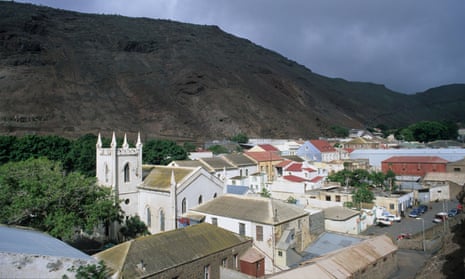A £285m airport built on a remote South Atlantic island with UK government cash will require “an open chequebook” if it is to ever welcome commercial airlines as planned, a select committee hearing has been told.
Plans to build a clifftop runway on St Helena were approved in 2010 by then ministers Andrew Mitchell and William Hague, making it the single largest investment made in an overseas territory. But its inauguration ceremony for commercial flights was suspended indefinitely in May after tests showed that planes could be blown off course.
On Wednesday, civil servants from the Department for International Development (DfID) were unable to tell the public accounts committee why they had not tested for wind shear – a sudden powerful change in wind direction that can destabilise large aircraft – before the airport was built. Meg Hillier, the chair of the committee, said more public money would have to be spent if the airport was to ever function for the island’s 4,000 inhabitants.
One of the more drastic options that has been considered and rejected by officials was to blow the top off two mountains adjoining the airfield, the committee was told. The more likely option to make the airport useable would be to allow smaller planes to fly to the island instead of the planned Boeing 737s.
Hillier said civil servants had already spent money allocated to them to make the airport useable. “Given that there is a UK commitment to the Saints [inhabitants of St Helena] and they are UK citizens, given that it is your responsibility and DfID’s to make that happen, and given that there is an airport there, it does seem that there is frankly an open chequebook because you have spent all that good money and you aren’t going to get anything for it,” she said.
Mark Lowcock, DfID’s permanent secretary, told the committee repeatedly that he would prefer not to say who might be to blame for failing to discover the strong winds at the airport because of an ongoing internal review.
He said officials were in talks with carriers about launching flights, but it would involve much smaller planes than previously envisaged.
Stephen Phillips, a Conservative committee member, pointed out to Lowcock that in the 19th century the anthropologist Charles Darwin in his travel journal The Voyage of the Beagle referred to the wind shear on St Helena.
“Darwin wrote this: ‘The only inconveniences I experienced on my walks [on St Helena] were from the impetuous winds. One day I noticed a curious circumstance: standing on the edge of a plain, terminated by a great cliff of about a thousand feet in depth, I saw at the distance of a few yards right to windward, some tern, struggling against a very strong breeze, whilst, where I stood, the air was quite calm.’
“If Charles Darwin, as he does in this passage, gives a very good example of wind shear in St Helena in 1836, how have we got a position where DfID commissioned a £285.5m airport, paid for by the British taxpayer, without appreciating the danger of wind shear?”
Lowcock replied: “That is a very good question, and one I will attempt to answer in my review.”
Phillips also raised the possible option, mentioned in previous media reports, of blowing up the tops of two mountains. “I have the greatest respect for the civil service but I did not realise that it could move mountains,” he said.
Lowcock replied: “It is not my plan currently to spend a lot of money exploring that option. My plan is to put in place a safe air service.”
Caroline Flint, the former Labour minister, asked Lowcock if he was aware that the businessman and former Conservative donor Lord Ashcroft had argued in favour of the airport weeks before it was approved by ministers. Lowcock replied that he had not been approached by Ashcroft.
Ministers are resisting offering any compensation to those who made investments on the basis that up to 30,000 tourists would fly to visit the remote island. At present, it takes a five-day trip by ship to reach St Helena from southern Africa.
One airline, Atlantic Star, on Wednesday urged the government to discuss a rapid introduction of “a much-needed air service” in and out of St Helena. Its proposal would involve using a specialist Avro RJ100 jet, with the airline able to begin flights next spring.
The airline ran a test flight to St Helena on 21 October. The island, which is about 1,200 miles west of Angola, was where Napoleon was exiled in 1815 after his defeat at Waterloo. He died there in 1821.
